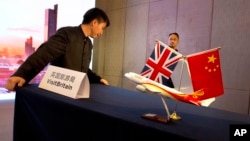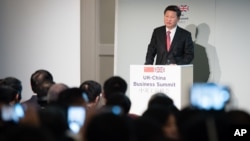Chinese politicians and business people are increasingly nervous about the upcoming vote in Britain on whether the nation should leave the European Union. Several eminent personalities, including Chinese President Xi Jinping, have said Britain should not exit the regional grouping because they see the nation as a gateway to the European market as a whole.
China has both political and economic reasons to worry about the prospects of British voters choosing to leave the European Single Market at the referendum on June 23. British politicians have been trying to persuade the EU to amend its attitude toward China on different issues, like giving it the status of a free market economy.
Last year, Britain became the first European country to join the China-sponsored Asian Infrastructure Investment Bank, or AllB, at the cost of displeasing the United States, which has stayed out of it. This led to several European countries, including Germany and France, to join the AIIB, giving Beijing heightened status in the financial world.
China last week chose London over New York to launch the first offshore yuan bond outside Hong Kong, which is part of its own territory. This, observers say, is among the many signals that Beijing has sent about the rising importance of London as long as it remains an important financial center in the world.
"From the Chinese perspective, London would certainly become less attractive should it disconnect itself from the other 27 EU members," said David Gosset, director of Academia Sinica Europaea at the China Europe International Business School, known as CEIBS. Gosset also said, "Stability and predictability attract while uncertainties and the unknown are unappealing and a source of concerns."
High stakes game
The stakes are high for both China and Britain. China is expected to invest eight to 10 times more money in Britain by 2025 than what it has done between 2010 and 2015, analysts said. The British Chamber of Commerce in China quoted international law firm Pinsent Masons as saying China intended to invest nearly $150 billion in British infrastructure by 2025 with energy, property and the transport sectors likely to be particularly popular.
Wang Jianlin, China's wealthiest businessman and founder of real estate and entertainment group Dalian Wanda, said, "Should Britain exit the European Union, many Chinese companies would consider moving their European headquarters to other countries.” Wang's investments in Britain include a luxury yacht company and a five-star hotel in London.
Britain has seen a flurry of Chinese investments in infrastructure and property sectors since last October, when Prime Minister David Cameron and President Xi shook hands in London while committing themselves to a "special relationship." They include Chinese purchases of stakes in Barclays, British Petroleum, Weetabix, Anglo American, and both the Heathrow and Manchester airports.
China's gateway to Europe
China has successfully used Britain to showcase its ability to build and run highly complex infrastructure and industrial projects in order to persuade other European countries, which have been reluctant to hand over contracts to Chinese state-owned and private companies. Beijing has reasons to worry that the "gateway opportunities" available in Britain would be lost if voters choose to get out of the European Union.
State-owned China Investment Corporation owns 8.6 percent of Thames Water and 10 percent of Heathrow Airport Holdings. Chinese state operator China General Nuclear Power Corporation, or CGN, is trying to build the controversial nuclear energy facility at Hinkley Point C.
"I think there would be a significant risk. The amount of investment coming into the UK could decline because, for many foreign firms, including those from China, the UK is seen as a gateway to the EU market," Andrew Kenningham, economist at Capital Economics, said.
Chinese companies were responsible for 112 foreign direct investments in Britain, resulting in 5,927 new and secured jobs in the financial year 2014/15, according to the British Chamber.
Deviating from non-interference mantra
China prides itself about not interfering in the internal affairs of other countries; but, it made a detour in the ‘Brexit’ debate last February when the Chinese Foreign Ministry said, “China has always supported the European integration process, as we would like to see Europe play a greater role in international affairs.” Earlier, Xi told the British prime minister, “China hopes to see a prosperous Europe and a united EU, and hopes Britain, as an important member of the EU, can play an even more positive and constructive role in promoting the deepening development of China-EU ties."
Jan Gaspers, the head of research in the European China policy unit of the Berlin-based Mercator Institute for China Studies, pointed out that at least half of the Chinese companies who have invested or have plans to invest in Britain are "actually looking at the continental European market."
“If Britain goes out of the EU, it will lose much of its influence as a suitable destination for Chinese investments," Gaspers said.
British business people have also been warning their government about the risks involved in the Brexit vote. Andrew Mackenzie, the chief executive BHP Billiton, the world’s biggest mining company, said, “I can tell you from my dealings with the highest level of the Chinese government that China takes Britain far more seriously because we are a major player in the EU."











